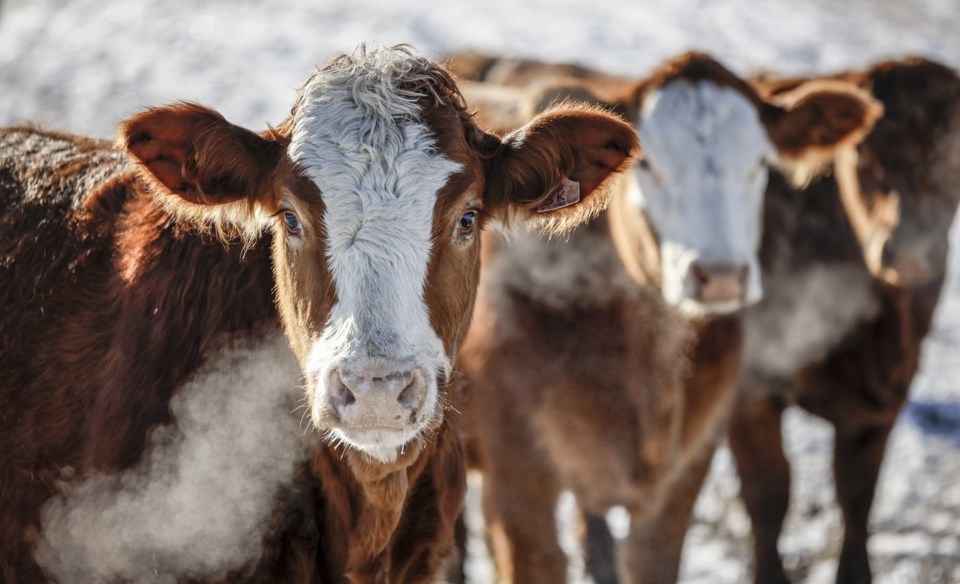CALGARY — China's ongoing ban on Canadian beef appears to have no end in sight, making it a textbook example of the uncertainty Canadian exporters continue to face in that market.
Shock waves went through Canada's agricultural industry earlier this month after China launched an anti-dumping investigation into Canadian canola imports, an apparent response to Canada's decision in August to hike tariffs on Chinese-made electric vehicles.
The investigation could result in China imposing heavy tariffs on Canadian canola, a move that could mean a $1-billion hit to Canadian farmers and exporters, according to a DBRS Morningstar estimate.
But well before canola was caught in the crossfire, Canadian beef was already facing difficulties in the Chinese market. China has been blocking beef shipments from Canadian processing plants for almost three years, ever since an atypical case of bovine spongiform encephalopathy (BSE) was found on an Alberta farm in December 2021.
Atypical BSE develops spontaneously in about one in every million cattle. It is not the same as classic BSE, which is more commonly known as mad cow disease. Atypical BSE poses no health risk to humans, unlike the classic strain which has been linked to the fatal neurological disorder Creutzfeldt-Jakob disease.
An atypical BSE case does not typically have international trade implications, and China is the only global market that continues to block Canadian beef due to the 2021 discovery.
China has provided no timeline for when it might lift the ban, even though Canada has provided all the information the Chinese government has requested about the 2021 case, Samantha Seary, spokeswoman for Agriculture and Agri-Food Canada, said in an email.
"Canadian officials continue to regularly engage with Chinese authorities to address trade issues, press for the restoration of market access for impacted products without further delays, and encourage China to base its trade measures on international scientific guidance and science-based trade rules," Seary said.
While China is the world's largest importer of Canadian canola seed, it is a less significant market for beef producers. Still, before the 2021 ban, China was Canada’s third-largest beef export market, importing $193 million worth of product annually.
"It certainly is viewed as a growth market," said Chris White, president and CEO of the Canadian Meat Council, which represents meat packers and processors.
"It's why we want to get back in there, right? Because other countries are already there taking market share."
White, who just returned from a trip to China during which he spent time pushing for the restoration of beef trade, acknowledged that many within the industry are frustrated the issue has dragged on so long.
He also acknowledged that the electric vehicle and canola issues have complicated relations between the two countries, but he said he doesn't believe there is a connection between those issues and the time it is taking to make progress on the beef file.
"I think they are just taking their time," he said. "My sense is China is fairly pragmatic. If they need something, they'll take in the product. And if they don't, because there are other considerations, then they won't. They won't advance their timetable."
In 2019, Chinese-Canada trade relations went through a particularly rocky period when China barred canola seed imports from two major Canadian grain shippers amid heightened tensions following the Canadian detention of Huawei executive Meng Wanzhou at the request of the United States.
Industry estimates peg the cost to the Canadian canola sector of that action at $1.5 billion to $2.4 billion between 2019 and 2020.
In a French-language speech Monday to the Montreal Council on Foreign Relations, Canada's ambassador to China Jennifer May said this country's relations with China have improved since then, but added Canada no longer enjoys the green light of "business as usual" with China.
"The analogy I constantly use while advising Canadian companies looking to do business in China is that of the yellow light," May said.
"You can engage there to seize opportunities, but do so with caution and in a well-informed manner."
May added the federal government continues to advise that Canadian companies operating in China diversify their exports to other countries to reduce their risk.
White said China's large population and rapidly growing middle class make it a very attractive market for Canadian beef exporters, but added companies are also keenly interested in developing other Asian markets that are seen as more "stable."
"Companies want to be in China, but (if you're going to operate there), you have to be cognizant that there are variables out of your control," White said.
"You might find yourself out, and when you're out, you may be out longer than you might be in other markets, for all sorts of reasons."
This report by The Canadian Press was first published Sept. 20, 2024.
— With files from Dylan Robertson in Ottawa
Amanda Stephenson, The Canadian Press



